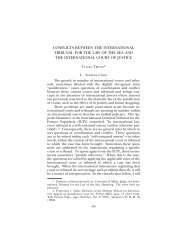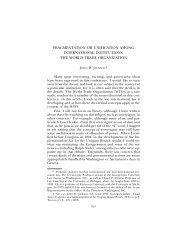some concluding remarks - Project on International Courts and ...
some concluding remarks - Project on International Courts and ...
some concluding remarks - Project on International Courts and ...
Create successful ePaper yourself
Turn your PDF publications into a flip-book with our unique Google optimized e-Paper software.
1999] CONCLUDING REMARKS 925ent powers of the Internati<strong>on</strong>al Court. In the same vein, arbitralawards can be attacked before the ICJ, as they were twice. 3But here again these appeals were introduced, like any othercase, <strong>on</strong> the basis of a specific jurisdicti<strong>on</strong>al title rather than<strong>on</strong> the basis of unity <strong>and</strong> c<strong>on</strong>tinuity of the adjudicative system.III. BACK TO THEORYAs menti<strong>on</strong>ed earlier, the prodigious development of internati<strong>on</strong>allaw in the last few decades, reflected in the greaterdensity, complexity, <strong>and</strong> diversity of its normative c<strong>on</strong>tent, hasalso led to the multiplicati<strong>on</strong> of specialized mechanisms of implementati<strong>on</strong>,including tribunals. This c<strong>on</strong>firms what I c<strong>on</strong>siderto be a law of legal physics, which can be formulated asfollows: “To each level of normative density, there corresp<strong>on</strong>dsa level of instituti<strong>on</strong>al density necessary to sustain thenorms” (i.e., which makes it possible to manage <strong>and</strong> applythem). 4 In other words, in these circumstances, the multiplicati<strong>on</strong>of specialized tribunals is, by itself, a healthy phenomen<strong>on</strong>.Its descripti<strong>on</strong> by the term “proliferati<strong>on</strong>,” with its negativec<strong>on</strong>notati<strong>on</strong>s, is misleading. Of course, proliferati<strong>on</strong> is extremelydangerous when we speak of lethal weap<strong>on</strong>s of massdestructi<strong>on</strong>. But it is a totally different matter when we speakof tribunals or other law-determining agencies in a system thathas notoriously suffered, throughout its existence, from thedearth (not to say lack) of objective determinati<strong>on</strong>s.Pierre Teilhard de Chardin has defined evoluti<strong>on</strong> as complexificati<strong>on</strong>-c<strong>on</strong>science,a process of c<strong>on</strong>scious complexificati<strong>on</strong>.As things become more complex, they reflect a higher degreeof divisi<strong>on</strong> of labor, or specializati<strong>on</strong>, which is a higher stage ofevoluti<strong>on</strong>. But the participants in this process must be c<strong>on</strong>sciousof its directi<strong>on</strong> <strong>and</strong> requirements. The further the divisi<strong>on</strong>of labor <strong>and</strong> specializati<strong>on</strong>, the greater the need for thepreservati<strong>on</strong> of the unity of the whole that makes specializati<strong>on</strong>possible <strong>and</strong> meaningful, but which becomes harder tomaintain because of the centrifugal effects of specializati<strong>on</strong>.3. See Case C<strong>on</strong>cerning the Arbitral Award Made by the King of Spain<strong>on</strong> 23 December 1906 (H<strong>on</strong>d. v. Nicar.), 1960 I.C.J. 192 (Nov. 18); CaseC<strong>on</strong>cerning the Arbitral Award of 31 July 1989 (Guinea-Bissau v. Sen.), 1991I.C.J. 53 (Nov. 12).4. Cf. Georges Abi-Saab, Cours général de droit internati<strong>on</strong>al public, 207RECUEIL DES COURS 9, 93 (1987).






